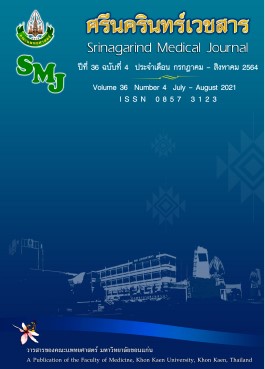Production of Truncated Recombinant Dengue Virus Envelope Protein and its Immunogenicity in BALB/c Mice
Keywords:
Dengue virus; truncated envelope protein; antigen; immunogenAbstract
Background and objective: Dengue is a major public health problem in tropical and subtropical countries. The four dengue virus serotypes can cause a wide range of mild to severe diseases. Many research and development efforts are ongoing to find a better effective and accessible version of vaccine, therapeutic agent, or diagnostic tool. Envelope (E) protein is a primary target for serologic diagnosis and immunization. This work aimed to express and characterize truncated E (rE74-118) protein of dengue virus serotype 2 (DENV-2) in both in vitro and in vivo properties.
Methods and results: A truncated DENV-2 envelope E protein, amino acid sequence 74-118, encoding gene was amplified and cloned into the pET-32b plasmid. The recombinant plasmid was then expressed in Escherichia coli (SHuffle) to produce the recombinant protein rE74-118. Recombinant E protein in truncated form (rE74-118) was successfully constructed, expressed, and purified in the concentration of 5.8 mg/ml. The rE74-118 protein was tested for its specificity with an anti-E monoclonal antibodies and dengue patient sera. Furthermore, its immunogenicity in BALB/c mice was also tested. The results showed that the rE74-118 protein can specifically react to anti-E monoclonal antibodies and dengue patient sera. This protein also induces the humoral response with a low-level of neutralizing activity against DENV-2, as well as the protein do not show enhancing activities against all four serotypes.
Conclusion: The truncated rE74-118 protein showed both antigenic and immunogenic properties in these in vitro and in vivo characterizations.
References
2. Modis Y, Ogata S, Clements D, Harrison SC. A ligand-binding pocket in the dengue virus envelope glycoprotein. Proc Natl Acad Sci U S A 2003; 100(12): 6986-91.
3. Wahala WM, Silva AM. The human antibody response to dengue virus infection. Viruses 2011; 12:2374-95.
4. Sasaki T, Setthapramote C, Kurosu T, Nishimura M, Asai A, Omokoko MD, et al. Dengue virus neutralization and antibody-dependent enhancement activities of human monoclonal antibodies derived from dengue patients at acute phase of secondary infection. Antiviral Res 2013; 98(3): 423-431.
5. Dejnirattisai W, Wongwiwat W, Supasa S, Zhang X, Dai X, Rouvinski A, et al. A new class of highly potent, broadly neutralizing antibodies isolated from viremic patients infected with dengue virus. Nat Immunol 2015; 16(2): 170-177.
6. Nadugala MN, Premaratne PH, Goonasekara CL. Systematic Bioinformatic Approach for Prediction of Linear B-Cell Epitopes on Dengue E and prM Protein. Adv Bioinformatics 2016: 1373157.
7. Zheng A, Umashankar M, Kielian M. In vitro and in vivo studies identify important features of dengue virus pr-E protein interactions. PLoS Pathog 2010; 6(10): e1001157.
8. Stephan T Kudlacek, Stefan W Metz, Focused dengue vaccine development: outwitting nature's design, Pathogens and Disease 2019; 77(1): ftz003.
9. Thomas A, Thiono DJ, Kudlacek ST, Forsberg J, Premkumar L, Tian S, et al. Dimerization of Dengue Virus E Subunits Impacts Antibody Function and Domain Focus. J Virol 2020; 94(18): e00745-20.
10. Setthapramote C, Sasaki T, Puiprom O, Limkittikul K, Pitaksajjakul P, Pipattanaboon C, et al. Human monoclonal antibodies to neutralize all dengue virus serotypes using lymphocytes from patients at acute phase of the secondary infection. Biochem Biophys Res Commun 2012; 423(4): 867-872.
11. Pipattanaboon C, Sasaki T, Nishimura M, Setthapramote C, Pitaksajjakul P, Leaungwutiwong P, et al. Cross-reactivity of human monoclonal antibodies generated with peripheral blood lymphocytes from dengue patients with Japanese encephalitis virus. Biologics 2013; 7: 175-1787.




